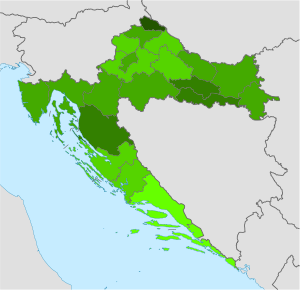
Back استفتاء عضوية كرواتيا في الاتحاد الأوروبي 2012 Arabic Referendum o pristupanju Hrvatske Evropskoj uniji 2012. BS Folkeafstemningen om Kroatiens EU-medlemskab 2012 Danish Referendum in Kroatien über den Beitritt zur Europäischen Union German Referéndum sobre la adhesión de Croacia a la Unión Europea Spanish Kroatian EU-kansanäänestys Finnish Référendum croate sur l'adhésion à l'Union européenne French Referendum o pristupanju Hrvatske Europskoj uniji Croatian Referendum in Croazia del 2012 Italian Folkeavstemningen om EU-medlemskap i Kroatia 2012 NB
| ||||||||||||||||||||||
Are you in favour of the membership of the Republic of Croatia in the European Union? | ||||||||||||||||||||||
| Results | ||||||||||||||||||||||
|---|---|---|---|---|---|---|---|---|---|---|---|---|---|---|---|---|---|---|---|---|---|---|
| ||||||||||||||||||||||
 Results by county
| ||||||||||||||||||||||
 |
|---|

A referendum on the EU accession of the Republic of Croatia was held on 22 January 2012. Croatia finished accession (membership) negotiations on 30 June 2011 and signed the Treaty of Accession on 9 December 2011, setting it on course to become the bloc's 28th member state. The Constitution of Croatia requires that a binding referendum be held on any political union reducing national sovereignty, such as via European Union membership. On 23 December 2011 the Croatian Parliament made a preliminary decision on EU accession and determined that the referendum would be held on 22 January 2012. The 2012 Croatian EU accession referendum was the first referendum held in Croatia since the Croatian independence referendum held more than 20 years earlier, in 1991.
The Croatian EU accession referendum campaign officially began on 3 January 2012; a yes vote was supported by both the political parties in government and the larger opposition parties in Croatia. The largest parties' joint support of EU membership existed since 2005, when the Alliance for Europe (Croatian: Savez za Europu) was set up as an informal alliance aimed at achieving membership as a strategic goal of Croatian foreign policy. Opposition to Croatian EU accession was voiced by non-parliamentary parties only. The pro-membership and informational campaign – which included television promotional videos, addresses by leading government and opposition politicians, and information booklets mailed to every household in Croatia – was announced to have cost 4.8 million kuna (c. €640,000). Opinion polling was regularly carried out by three different agencies; since May 2011, percentages supporting EU membership ranged between 55% and 63%. The Croatian State Election Committee was in charge of vote organization, ballot counting and result publication.
The EU accession referendum passed with 66.27% votes cast in support, 33.13% against the proposed joining of the EU and 0.60% invalid or blank votes; it also passed in all Croatian counties. The greatest support for the referendum was recorded in Međimurje and Brod-Posavina counties, at 75.73% and 72.61% respectively. The lowest support for EU accession was recorded in Dubrovnik-Neretva County, where 42.22% of votes were cast against the proposal. The average official turnout for the referendum was 43.51%; the highest official turnouts were recorded in the city of Zagreb and in Varaždin County at 55.13% and 53.66% respectively. The result was binding on the Croatian Parliament; as a consequence, it ratified the accession treaty on 9 March 2012. The outcome was welcomed by all political parties represented in Croatia's parliament; some right-wing politicians objected to the low turnout and what they consider a loss of independence.
© MMXXIII Rich X Search. We shall prevail. All rights reserved. Rich X Search